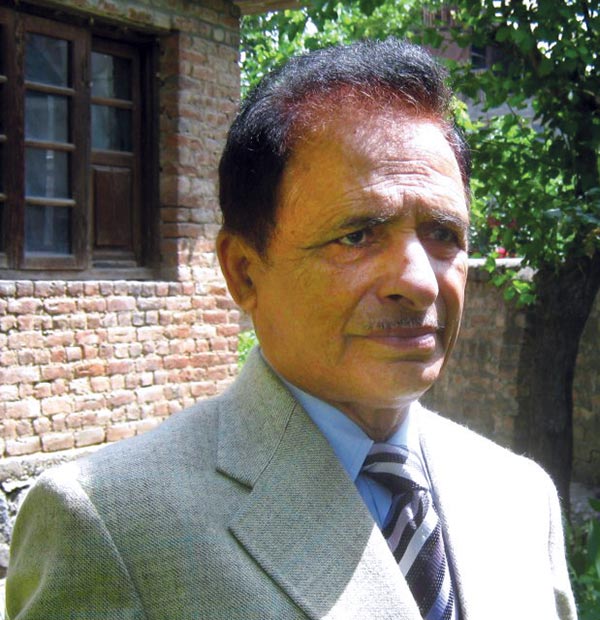Renowned educationist and former dean faculty of education and director state resource centre in University of Kashmir, Dr Abdul Gani Madhosh, tells Saima Bhat, that government schools should adopt ‘private school model’ for sake for student’s future
 KL: What is the present scenario of education in the state?
KL: What is the present scenario of education in the state?
Abdul Gani Madhosh (AGM): There is communication gap between those who run the show and those who work on the ground. It is unfortunate that the directorate of education, or people sitting in the civil secretariat framing polices, know nothing about issues faced by the education sector. The performance of a school is monitored by the district commissioners and tehsildars, and not by CEOs, or ZEOs as desired.
One can only imagine the level of trust deficit in the sector as examination papers of 8th, 10th and 12th class are kept with police and not with the principals.
Instead of directorate of school education, it is judiciary that decides the school timing, fee structure, and duration of winter or summer vacations etc. In nutshell, director school education is left with virtually no role to play in state’s education sector.
It all happens despite the fact that we have a well connected hierarchy system in place. There is Chief Education Officer (CEO), Zonal Education Officer (ZEO), Block Education Officer (BEO) etc. But still the show is being run by those who have nothing to do with
KL: What is the solution?
AGM: There is solution to every problem only if we are ready to address. Take for example board examination. Every year lakhs of students appear in the 8th, 10th and 12th class examinations, but our state board is not fully equipped to manage it properly, and they end up declaring the results in haste. This negates that entire purpose of conducting an examination i.e. to assess a student; and then on the basis of this assessment to help him improve. I have instances where results were tampered to favour a few blue-eyed students.
KL: Is there an alternative to exams?
AGM: Yes. We can assess a student’s performance through Continuous Comprehensive Evaluation (CCE) system. It would be great if we evaluate a student throughout the year, rather than conducting a single exam at the end of the year.
Another pressing issue is of curriculum that we have in vogue in government schools. You will be amazed to see the kind of books that students in government schools read. They are full of mistakes. Even books on grammar are full of errors. No doubt books prescribed for government schools are cheap, but they are cheap in content too. Why nobody takes notice of that? Private sector is doing far better in terms of quality of education and resources.
Unfortunately, the role of directorate of education is limited to issuing press notes confirming dates of winter and summer vacations and exams etc. rest they are nowhere.
KL: There are certain rules and regulations set for the betterment of education sector by the state board for both private as well as government schools?
AGM: The role of private players in education sector is a reality now. Let us face it without prejudice or bitterness. The problem with our policymakers is that they live in a denial mode; they don’t want to acknowledge the contribution of private schools viz-a-viz improving the state of education in J&K. We have quality private schools since last 150 years in Kashmir. How can anybody forget contribution of Dr Novels, Tyndale Biscoe and Maulana Ghulam Rasool (Nusrat-ul-Islam)?
Instead of telling private schools to imitate government policies, I think government should adopt models of private schools.
KL: Since 2001 you were part of eight committees formed to frame a policy on education. What is the progress?
AGM: There is no significant progress so far. The recent committee was formed by the previous National Conference government in 2003. There were fifteen members in that committee headed by Prof Farida Khan of Jamia Milia Islamia. By the time committee came up with certain recommendations, there was change of government in the state, and everything was started afresh. I believe the present government, instead of constituting a new committee, should take into consideration recommendations of all the committees formed since 2001. That will help government save time, energy and resources. But unfortunately the present government preferred to start afresh instead.
KL: Despite substantial funds available for the upliftment of infrastructure and improve quality of education, why government schools are in a mess?
AGM: Unfortunately our education sector is directly connected with the vote-bank politics. Every MLA, or a minister wants a school, college, and even a university established in his constituency to appease his voters. This only degrades the quality of education. These schools, once established to appease a politician and his followers, are then forgotten by the very system that created them due to lack of resources. In most of the cases these institutions don’t have even a single specilised teacher!
Having a primary school after every kilometer, a middle school after every 5 kilometer, a higher secondary school after every 11 kilometers is an ideal situation. But it would be better if the government can consolidate all these schools and colleges and provide students better infrastructure, library, laboratory, sports facilities, with quality education at a single point.
A student of mine was once asked to prepare a list of poor students in a particular district. After days of data collecting she compiled a list of 187 students who deserve financial assistance. But when the list was sent to MLA of the area, it got completely re-written. Just five of the original deserving students made it to the final list!















